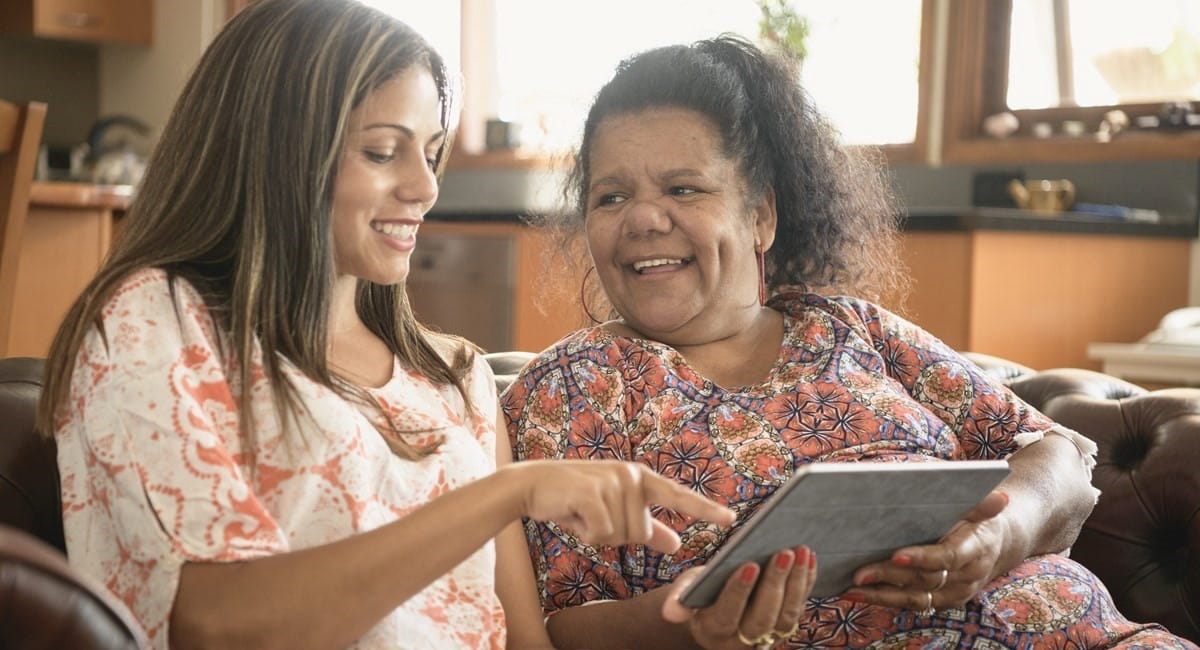“The right support can make a huge difference to your independence, wellbeing and quality of life.”—Danielle Biviano, General Manager, Southern Region Home Care Services at Australian Unity.
Key points
- You may be able to access government programs that are designed to enable you to stay independent and at home longer as you get older.
- The Australian government subsidises the cost of various home care services with the aim of making them accessible for everyone who needs them.
- Some packages also allow you to use your funding to purchase aids, equipment and make minor modifications to your home.
As you get older, you might start to feel you could benefit from getting help around the home. Perhaps the gardening is getting too much for you, you’re finding it hard to get to the shops, or housework is taking up so much energy that there’s none left for the things you enjoy.
The good news is that the government subsidises a wide range of services from various providers to support your wellbeing and help you to stay active and independent. Here’s a breakdown of what’s available, where you can find them and how they could work for you.

What sort of help is available?
Depending on your personal situation, you may be able to access government programs that are designed to enable you to stay independent and at home longer as you get older. If you’re not sure whether they are suitable for you, it’s still worth checking out your options – you never know what you could be eligible for.
Commonwealth Home Support Programme (CHSP)
The Commonwealth Home Support Programme is often the first point of contact people will have with support services. The program is designed to provide a little extra help with things like chores and preparing food so that people can continue to live independently. “CHSP can also provide short-term support to help you get back on your feet after an accident or illness,” says Danielle Biviano, General Manager – Southern Region Home Care Services at Australian Unity.
Home Care Packages (HCP)
If you need more complex care on an ongoing basis, you might be eligible for one of the four levels of Home Care Packages. The package assigned to you is based on your needs, from basic to high care. You then work with your chosen provider to decide how best to spend your package funding according to the support you need, from cleaning and transport to personal care and nursing. You can also use your funding to purchase aids, equipment and make minor modifications to your home.
Short-term restorative care (STRC)
If you are experiencing increased difficulty in managing everyday tasks, this program can assist by helping you to manage or adapt to your changing needs. For example, using exercise to improve your strength and balance, or making minor modifications to your home to make tasks easier.
Short-term restorative care provides programs run by health professional that assist you to reverse or slow the issues you are having with everyday tasks. According to Danielle, “STRC will often delay the need for long-term care and support by helping you to return to earlier or improved levels of independence.”

Veterans’ programs
If you or a family member has a Veteran Gold or White Card you may be eligible for either the Veterans’ Home Care (VHC) program, which provides basic, practical help, or DVA Community Nursing, where qualified nurses and support staff visit your home to help with things like hygiene, showering or dressing.
Aboriginal Home Care
Aboriginal Home Care provides the same levels of support as CHSP and HCP, but in a culturally tailored way.
“We engage our customers from a place of knowing about cultural protocols,” says Trish Oxford, General Manager of Business Development & Community, Indigenous Services at Australian Unity. “Eighty-five percent of our care workers are Aboriginal and all have intimate knowledge of, and connection to, the community and the elders.”
Many Aboriginal Home Care customers begin with one of the higher levels of care. “Our cultural practices are based around respecting elders,” says Trish. “Younger generations care and support elders as long as they can.”
How much do I have to pay?
The Australian government subsidises the cost of various home care services with the aim of making them accessible for everyone who needs them.
And, if you can afford it, there’s an option to pay privately for extra services.
“Most HCP providers offer private services or the ability to ‘top-up’ your package,” explains Danielle.
How do I get the help I need?
To find out what support services you are eligible for, you’ll first need to apply for an assessment by calling My Aged Care on 1800 200 422 or applying online. Depending on the information you provide, you’ll receive an appointment for either a phone assessment or an at-home face-to-face evaluation of your needs. If you wish, you can have a friend or family member with you for support.
“Aboriginal people often find it helpful to have a member of our team with them to ensure there are no misunderstandings,” says Trish. “Some of the questions can sound very personal and may need to be rephrased so they’re culturally appropriate.”

How long will I have to wait?
Once you’ve been assessed for CHSP, services could start within two weeks, although the length of time will depend on the services you need and the availability of service providers in your area.
When you have been assessed for an HCP you’ll join a national queue and can expect to wait about three to six months for the lowest level of care, and 12 months or more for intermediate to higher-level packages.
What happens if I need more help?
If your needs change while you’re waiting for your care to start, contact My Aged Care and ask to be assessed for a higher level of funding or increased priority. If you’re already receiving care, your provider can refer you back to My Aged Care so you can be reassessed to see whether you’re eligible for a higher- level HCP.
Don’t wait to ask for help
As we’ve seen, there are waiting times for some types of help so it’s best to start the application process as soon as you find yourself in need. As Danielle explains: “The right support can make a huge difference to your independence, wellbeing and quality of life.”
Disclaimer: Information provided in this article is of a general nature. Australian Unity accepts no responsibility for the accuracy of any of the opinions, advice, representations or information contained in this publication. Readers should rely on their own advice and enquiries in making decisions affecting their own health, wellbeing or interest. Interviewee names and titles were accurate at the time of writing.


